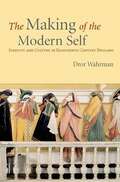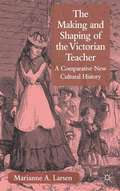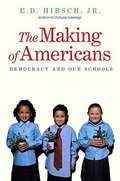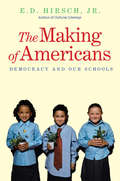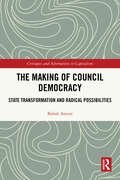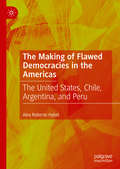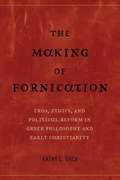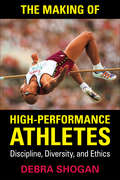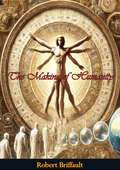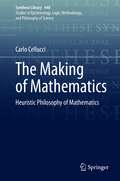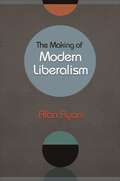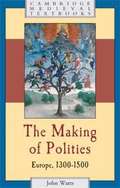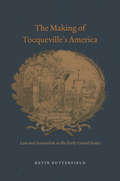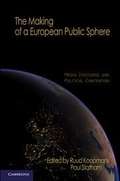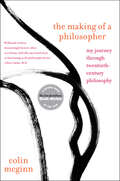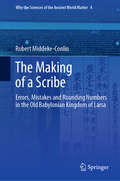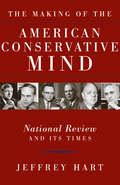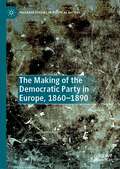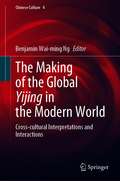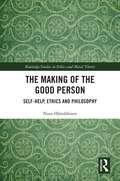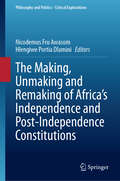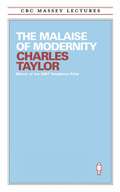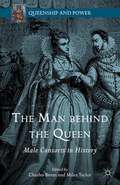- Table View
- List View
The Making Of The Modern Self: Identity And Culture In Eighteenth-century England
by Dror Wahrman02 Toward the end of the eighteenth century, a radical change occurred in notions of self and personal identity. This was a sudden transformation, says Dror Wahrman, and nothing short of a revolution in the understanding of selfhood and of identity categories including race, gender, and class. In this pathbreaking book, he offers a fundamentally new interpretation of this critical turning point in Western history.Wahrman demonstrates this transformation with a fascinating variety of cultural evidence from eighteenth-century England, from theater to beekeeping, fashion to philosophy, art to travel and translations of the classics. He discusses notions of self in the earlier 1700s-what he terms the ancien regime of identity-that seem bizarre, even incomprehensible, to present-day readers. He then examines how this peculiar world came to an abrupt end, and the far-reaching consequences of that change. This unrecognized cultural revolution, the author argues, set the scene for the array of new departures that signaled the onset of Western modernity.Dror Wahrman is associate professor of history at Indiana University (Bloomington).
The Making and Shaping of the Victorian Teacher
by Marianne A. LarsenProviding comparative and international contexts to understand the history of the making of the teacher in Victorian England, this is a compelling account of the development during this time of teacher training, inspections and certification - reforms which shaped the good teacher as a modern and moral individual.
The Making of Americans: Democracy and Our Schools
by E. D. Hirsch Jr.This comprehensive and thought-provoking book offers a masterful analysis of how American ideas about education have veered off course, what must be done to right them, and most importantly why.
The Making of Americans: Democracy and Our Schools
by E. D. Hirsch Jr.From the bestselling author of Cultural Literacy, a passionate and cogent argument for reforming the way we teach our children.Why, after decades of commissions, reforms, and efforts at innovation, do our schools continue to disappoint us? In this comprehensive book, educational theorist E. D. Hirsch, Jr. masterfully analyzes how American ideas about education have veered off course, what we must do to right them, and most importantly why. He argues that the core problem with American education is that educational theorists, especially in the early grades, have for the past sixty years rejected academic content in favor of &“child-centered&” and &“how-to&” learning theories that are at odds with how children really learn. The result is failing schools and widening inequality, as only children from content-rich (usually better-off) homes can take advantage of the schools&’ educational methods.Hirsch unabashedly confronts the education establishment, arguing that a content-based curriculum is essential to addressing social and economic inequality. A nationwide, specific, grade-by-grade curriculum established in the early school grades can help fulfill one of America&’s oldest and most compelling dreams: to give all children, regardless of language, religion, or origins, the opportunity to participate as equals and become competent citizens. Hirsch not only reminds us of these inspiring ideals, he offers an ambitious and specific plan for achieving them.&“Hirsch&’s case is clear and compelling. His book ought to be read by anyone interested in the education and training of the next generation of Americans.&”—Glenn C. Altschuler, The Boston Globe&“Hirsch once again challenges the prevailing &“child-centered&” philosophy, championing a return to a &“subject-centered&” approach to learning.&”—Publishers Weekly
The Making of Council Democracy: State Transformation and Radical Possibilities (Critiques and Alternatives to Capitalism)
by Babak Amini“Council democracy” is a particular form of democratic socialism that strives towards democratic self-governance on the basis of active, free, and associated individuals working cooperatively within a federated council system. Both in political practice and in social theory, “council democracy” has resurfaced periodically in the past, most notably in the interwar period, in the “long 1960s,” and since the turn of the 21st century. This book offers a novel theoretical and methodological approach to the study of “council democracy.” It focuses on the processes that led to the emergence of two of the foundational and most radical instances of “council democratic” movements in Germany during the German Revolution (1918-1919) and in Italy during the biennio rosso (1919-1920). With all their diversities, ambiguities, and shortcomings, these movements, in varying degrees, sought democratic alternatives to autocratic relations, from local to state levels, and to economic relations, from workplace to national levels. The book shows how the processes through which state-led war mobilization transformed the contours of class struggle laid the ground for the emergence of “council democratic” movements with specific characteristics in Germany and Italy and not in the United Kingdom and France.
The Making of Flawed Democracies in the Americas: The United States, Chile, Argentina, and Peru
by Alex Roberto HybelThis book strives to answer two interrelated questions: Why have certain states in the Americas been more successful than others at creating stable democratic regimes? Why have certain states in the Americas failed to create stable democratic regimes? To answer both questions, the author focuses on four states – the United States, Argentina, Chile, and Peru. Throughout the analysis, he isolates and evaluates the conditions that helped or hindered the development of each state and of its political regime. He presents his conclusions in the form of time-related explanatory hypotheses. By identifying and examining the conditions that brought about the transformation of each states and of its political regimes, this study ultimately facilitates a discussion of the future of democracy in each of these countries as well as in the world.
The Making of Fornication: Eros, Ethics, and Political Reform in Greek Philosophy and Early Christianity
by Kathy L. GacaSexual mores and practices, and the uses of sex in the properly regulated society, according to Greek philosophical schools and to some important early Christians. Gaca shows that the Christian thinkers did not form their ideas about sex from a basis in the Greek tradition, as Foucault thought and almost everybody else thinks.
The Making of High Performance Athletes
by Debra ShoganHighly skilled athletes are produced by technologies of training which seek to create the athlete as a singular identity. Yet the disciplinary model of modern sport is consistently disrupted by the diversity and hybridity of the participants. Using Foucault's work on disciplinary power as a theoretical framework, Debra Shogan, an academic in sports ethics and a coach of high performance athletes, examines the ways in which athletes are produced through technologies of training and the ethical issues which emerge when demands to improve performance envelopes athletes, coaches, administrators and sports scientists in decisions about how far to push the limits of performance. Making the case for a new, postmodern sports ethic, Shogan shows how the juxtaposition of hybrid athletes with the homogenizing technologies of sport discipline opens up spaces for questioning, refusing, and perhaps creating new ways of participating in sport.
The Making of Humanity
by Robert BriffaultExplore the profound forces and pivotal events that have shaped human civilization with Robert Briffault's The Making of Humanity. This thought-provoking and comprehensive work delves into the cultural, intellectual, and social developments that have defined the human experience, offering readers an insightful and engaging narrative of humanity's journey through history.Robert Briffault, a distinguished historian, anthropologist, and sociologist, meticulously examines the factors that have contributed to the development of human society. In The Making of Humanity, Briffault presents a sweeping analysis of the evolution of human culture, tracing the origins and growth of key concepts such as science, art, religion, and social organization.Briffault's work stands out for its interdisciplinary approach, drawing on evidence from a wide range of fields including history, anthropology, sociology, and philosophy. His narrative covers significant milestones in human development, from the dawn of civilization and the rise of ancient cultures to the transformative impacts of the Renaissance, the Enlightenment, and the Industrial Revolution.The Making of Humanity explores the intellectual revolutions that have propelled humanity forward, highlighting the contributions of great thinkers, inventors, and artists who have shaped the course of history. Briffault also addresses the complex interplay between human progress and the social and environmental challenges that have arisen along the way.Join Robert Briffault as he unravels the story of humanity's ascent, examining the triumphs and trials that have defined our species. The Making of Humanity is a timeless exploration of the human condition, offering readers a deeper appreciation of the cultural and intellectual legacy that continues to shape our world.
The Making of Mathematics: Heuristic Philosophy of Mathematics (Synthese Library #448)
by Carlo CellucciThis book offers an alternative to current philosophy of mathematics: heuristic philosophy of mathematics. In accordance with the heuristic approach, the philosophy of mathematics must concern itself with the making of mathematics and in particular with mathematical discovery. In the past century, mainstream philosophy of mathematics has claimed that the philosophy of mathematics cannot concern itself with the making of mathematics but only with finished mathematics, namely mathematics as presented in published works. On this basis, mainstream philosophy of mathematics has maintained that mathematics is theorem proving by the axiomatic method. This view has turned out to be untenable because of Gödel’s incompleteness theorems, which have shown that the view that mathematics is theorem proving by the axiomatic method does not account for a large number of basic features of mathematics. By using the heuristic approach, this book argues that mathematics is not theorem proving by the axiomatic method, but is rather problem solving by the analytic method. The author argues that this view can account for the main items of the mathematical process, those being: mathematical objects, demonstrations, definitions, diagrams, notations, explanations, applicability, beauty, and the role of mathematical knowledge.
The Making of Modern Liberalism
by Alan RyanOne of the world's leading political thinkers explores the history, nature, and prospects of the liberal traditionThe Making of Modern Liberalism is a deep and wide-ranging exploration of the origins and nature of liberalism from the Enlightenment through its triumphs and setbacks in the twentieth century and beyond. The book is the fruit of the more than four decades during which Alan Ryan, one of the world's leading political thinkers, reflected on the past of the liberal tradition—and worried about its future.This is essential reading for anyone interested in political theory or the history of liberalism.
The Making of Polities: Europe, 1300-1500
by John WattsThis major survey of political life in late medieval Europe - the first for more than thirty years - provides an entirely new framework for understanding the developments that shaped this turbulent period. Rather than emphasising crisis, decline, disorder or the birth of the modern state, this account centres on the mixed results of political and governmental growth across the continent. The age of the Hundred Years War, schism and revolt was also a time of rapid growth in jurisdiction, taxation and representation, of spreading literacy and evolving political technique. This mixture of state formation and political convulsion lay at the heart of the 'making of polities'. Offering a full introduction to political events and processes from the fourteenth century to the sixteenth, this book combines a broad, comparative account with discussion of individual regions and states, including eastern and northern Europe alongside the more familiar west and south.
The Making of Tocqueville's America: Law and Association in the Early United States (American Beginnings, 1500-1900 Ser.)
by Kevin ButterfieldAlexis de Tocqueville was among the first to draw attention to Americans’ propensity to form voluntary associations—and to join them with a fervor and frequency unmatched anywhere in the world. For nearly two centuries, we have sought to understand how and why early nineteenth-century Americans were, in Tocqueville’s words, “forever forming associations.” In The Making of Tocqueville’s America, Kevin Butterfield argues that to understand this, we need to first ask: what did membership really mean to the growing number of affiliated Americans? Butterfield explains that the first generations of American citizens found in the concept of membership—in churches, fraternities, reform societies, labor unions, and private business corporations—a mechanism to balance the tension between collective action and personal autonomy, something they accomplished by emphasizing law and procedural fairness. As this post-Revolutionary procedural culture developed, so too did the legal substructure of American civil society. Tocqueville, then, was wrong to see associations as the training ground for democracy, where people learned to honor one another’s voices and perspectives. Rather, they were the training ground for something no less valuable to the success of the American democratic experiment: increasingly formal and legalistic relations among people.
The Making of a European Public Sphere
by Ruud Koopmans Paul StathamThis book investigates an important source of the European Union's recent legitimacy problems. It shows how European integration is debated in mass media, and how this affects democratic inclusiveness. Advancing integration implies a shift in power between governments, parliaments, and civil society. Behind debates over Europe's "democratic deficit" is a deeper concern: whether democratic politics can perform effectively under conditions of Europeanization and globalization. This study is based on a wealth of unique data from seven European countries, combining newspaper content analyses, an innovative study of Internet communication structures, and hundreds of interviews with leading political and media representatives across Europe. It is by far the most far-reaching and empirically grounded study on the Europeanization of media discourse and political contention to date, and a must-read for anyone interested in how European integration changes democratic politics and why European integration has become increasingly contested.
The Making of a Philosopher: My Journey Through Twentieth-Century Philosophy
by Colin McGinnPart memoir, part study, The Making of a Philosopher is the self–portrait of a deeply intelligent mind as it develops over a life on both sides of the Atlantic.The Making of a Philosopher follows Colin McGinn from his early years in England reading Descartes and Anselm, to his years in the states, first in Los Angeles, then New York. McGinn presents a contemporary academic take on the great philosophical figures of the twentieth century, including Bertrand Russell, Jean–Paul Sartre, and Noam Chomsky, alongside stories of the teachers who informed his ideas and often became friends and mentors, especially the colorful A.J. Ayer at Oxford. McGinn's prose is always elegant and probing; students of contemporary philosophy and the general reader alike will absorb every page.
The Making of a Scribe: Errors, Mistakes and Rounding Numbers in the Old Babylonian Kingdom of Larsa (Why the Sciences of the Ancient World Matter #4)
by Robert Middeke-ConlinThis book presents a novel methodology to study economic texts. The author investigates discrepancies in these writings by focusing on errors, mistakes, and rounding numbers. In particular, he looks at the acquisition, use, and development of practical mathematics in an ancient society: The Old Babylonian kingdom of Larsa (beginning of the second millennium BCE Southern Iraq). In so doing, coverage bridges a gap between the sciences and humanities. Through this work, the reader will gain insight into discrepancies encountered in economic texts in general and rounding numbers in particular. They will learn a new framework to explain error as a form of economic practice. Researchers and students will also become aware of the numerical and metrological basis for calculation in these writings and how the scribes themselves conceptualized value. This work fills a void in Assyriological studies. It provides a methodology to explore, understand, and exploit statistical data. The anlaysis also fills a void in the history of mathematics by presenting historians of mathematics a method to study practical texts. In addition, the author shows the importance mathematics has as a tool for ancient practitioners to cope with complex economic processes. This serves as a useful case study for modern policy makers into the importance of education in any economy.
The Making of the American Conservative Mind: National Review and Its Times
by Jeffrey HartNational Review has been the leading conservative national magazine since it was founded in 1955, and in that capacity it has played a decisive role in shaping the conservative movement in the United States. In The Making of the American Conservative Mind, Jeffrey Hart provides an authoritative and high-spirited history of how the magazine has come to define and defend conservatism for the past fifty years. He also gives a firsthand account of the thought and sometimes colorful personalities—including James Burnham, Willmoore Kendall, Russell Kirk, Frank Meyer, William Rusher, Priscilla Buckley, Gerhart Niemeyer, and, of course, the magazine&’s founder, William F. Buckley Jr.—who contributed to National Review&’s life and wide influence.As Hart sees it, National Review has regularly veered toward ideology, but it has also regularly corrected its course toward, in Buckley&’s phrase, a &“politics of reality.&” Its catholicity and originality—attributable to Buckley&’s magnanimity and sense of showmanship—has made the magazine the most interesting of its kind in the nation, concludes Hart. His highly readable and occasionally contrarian history, the first history of National Review yet published, marks another milestone in our understanding of how the conservatism now so influential in American political life draws from, and in some ways repudiates, the intellectual project that National Review helped launch a half century ago.
The Making of the Democratic Party in Europe, 1860–1890 (Palgrave Studies in Political History)
by Anne HeyerThis book analyses the emergence of modern parties in nineteenth-century Europe and explores their connection with the slowly developing institution of democracy. The close relationship between party and democracy was established by the founders of the first modern parties who presented themselves as representatives of the people. Focusing on the ideas and practices of party founders, this book moves away from the traditional view that party formation was the result of industrialisation. It instead shows that the response of party founders was to frame and establish the modern party as an alternative to existing models of political representation, and one that was characterised by popular participation.In order to mobilize their followers, party founders gave new meaning to existing structures and developed new practices of political organization. The result was the creation of organizations that continue to shape the history of modern democracy.Exploring the foundation of three political parties: the German Social Democratic Workers’ Party (SDAP); the Dutch Anti-Revolutionary Party (ARP); and the British National Liberal Federation, the author analyses the phenomenon of innovative party formation in nineteenth-century Europe, before the democratic mass-membership party had become a widely accepted concept. Taking a transnational and comparative approach, this book illustrates the decisive role of party founders in the formation of modern democracy, making it an essential read for anyone researching the history of democracy and political parties.
The Making of the Global Yijing in the Modern World: Cross-cultural Interpretations and Interactions (Chinese Culture #4)
by Benjamin Wai-ming NgThis book represents an ambitious effort to bring leading Yijing scholars together to examine the globalisation and localisation of the 'Book of Changes' from cross-cultural and comparative perspectives. It focuses on how the Yijing has been used to support ideologies, converted into knowledge, and assimilated into global cultures in the modern period, transported from the Sinosphere to British, American and French cultural traditions, travelling from East Asia to Europe and the United States. The book provides conceptualised narratives and cross-cultural analyses of the global popularisation and local assimilation of the Yijing, highlighting the transformation and application of the Yijing in different cultural traditions, and demonstrating how it acquired different meanings and took on different roles in the context of a global setting. In presenting a novel contribution to understandings of the multifaceted nature of the Yijing, this book is essential reading for scholars and students interested in the 'Classic of Changes'. It is also a useful reference for those studying Chinese culture, Asian philosophy, East Asian studies, and translation studies.
The Making of the Good Person: Self-Help, Ethics and Philosophy (Routledge Studies in Ethics and Moral Theory)
by Nora HämäläinenThis book provides a philosophical assessment of the idea of personhood advanced in popular self-help literature. It also traces, within academic philosophy and philosophical scholarship, a self-help culture where the self is brought forth as an object of improvement and a key to meaning, progress, and profundity. Unlike other academic treatments of the topic of self-help, this book is not primarily concerned with providing a critique of popular self-help and self-transformative practices. Rather, it is concerned with how they work to shape contemporary forms and ideals of moral personhood and are conducive to moral renegotiation and change. The book consists of two parts with somewhat different argumentative strategies. Part 1 consists of an overview and reassessment of popular self-help literature and its sociological and journalistic critics, written from a moral philosophical perspective. Part 2 opens with discussion of the current attraction, among a range of philosophers, to self-transformative themes. The chapters assess the strand of self-transformative philosophy found in the work of Ludwig Wittgenstein, Michel Foucault, Pierre Hadot, Stanley Cavell, and Iris Murdoch. Finally, the book concludes with a discussion of the theme of social change and moral renegotiation in contemporary societies, which is a central but underestimated undercurrent in discussions on contemporary self-transformative practices. The book’s dual perspective—on both popular self-help and self-transformative currents in philosophy—enables a cultural and moral philosophical analysis of contemporary ethical ideals of personhood, as well as reflection on the literatures available for its development. The Making of the Good Person will be of interest to scholars and advanced students working in moral philosophy, history of philosophy, psychology, sociology, and literary studies.
The Making, Unmaking and Remaking of Africa’s Independence and Post-Independence Constitutions (Philosophy and Politics - Critical Explorations #31)
by Hlengiwe Portia Dlamini Nicodemus Fru AwasomThis book provides a collection of chapters that critically explore the making and development of Africa’s independence constitutions through the different phases in their full generality. Since independence, various constitutions from African countries have undergone a succession of changes, triggered by either the domestic or international environment or both. These processes constitute autonomous epochal ‘waves’ or ‘phases’ of constitution-making which need to be unpacked, historicised and explored in a systematic manner. This work, intended as a distinctive object of positive analysis, historicizes the independence constitutions of selected African states on either a country-specific or a comparative basis. A historical approach to the continental study of constitutions is rare, meaning the continental coverage of the book is justified by Africa’s rich diversity reflected in its multiple monarchical and colonial backgrounds. The book is of interest to academics interested in having a panoramic view of Africa's constitutional development from a historical perspective.
The Malaise of Modernity (The CBC Massey Lectures)
by Charles TaylorIn Malaise of Modernity, Charles Taylor focuses on the key modern concept of self-fulfillment, often attacked as the central support of what Christopher Lasch has called the culture of narcissism. To Taylor, self-fulfillment, although often expressed in self-centered ways, isn't necessarily a rejection of traditional values and social commitment; it also reflects something authentic and valuable in modern culture. Only by distinguishing what is good in this modern striving from what is socially and politically dangerous, Taylor says, can our age be made to deliver its promise.
The Man Behind The Queen
by Charles Beem Miles TaylorFrom the 14th-century king consorts of Navarre to the modern European prince consorts of the 20th century, the male consort has been a peculiar yet recurrent historical figure. In this impressively broad collection, leading historians of monarchy analyze how male partners of female rulers have negotiated their unique roles throughout history.
The Man Who Killed Martin Luther King: The Life and Crimes of James Earl Ray
by Mel AytonDoubts about James Earl Ray, Dr. Martin Luther King’s lone assassin, arose almost immediately after the civil rights leader was fatally shot on the balcony of the Lorraine Motel in Memphis on 4 April 1968. From the start, his aides voiced suspicions that a conspiracy was responsible for their leader’s death. Over time many Americans became convinced the government investigations covered up the truth about the alleged assassin. Exactly what led Ray to kill King continues to be a source of debate, as does his role in the murder. However, Mel Ayton believe the answers to the many intriguing questions about Ray and how conspiracy ideas flourished can now be fully understood. Missing from the wild speculations over the past fifty-two years has been a thorough investigation of the character of King’s assassin. Additionally, the author examines exactly how the conspiracy notions came about and the falsehoods that led to their promulgation. The Man Who Killed Martin Luther King is the first full account of the life of James Earl Ray based on scores of interviews provided to government and non-government investigators and from the FBI’s and Scotland Yard’s files plus the recently released Tennessee Department of Corrections prison record on Ray. Most importantly, the testimony of Anna Sandhu has often been ignored by writers but her story is crucial in gaining an understanding of Ray’s deceptive ways. A courtroom artist, who, after listening to Ray’s story, later married him. Also missing from accounts of the alleged ‘conspiracy’ is the story told to this author by Brushy Mountain State Penitentiary Deputy Warden Rolland H. Cisson, which decisively renders Ray’s claims of innocence to be bogus. In the short-lived freedom he acquired after escaping from the Missouri State Penitentiary in 1967, following being sentenced to twenty years in prison for repeated offenses, he traveled to Los Angeles and decided to seek notoriety as the one who would stalk and kill Dr. King, who he had come to hate vehemently. From the time of King’s murder, the reader will follow Ray to solitary confinement in a Nashville prison. Then, six years later, on 10 June 1977, James Earl Ray again escaped from prison, this time with five others. Ray was the last to be recaptured, having survived only on wheatgerm. Finally, the book relays Ray’s stabbing by several black inmates, then his resulting diagnosis with Hepatitis C, which caused his death twelve years later, in 1998.
The Man Who Knew Infinity: A Life of the Genius Ramanujan
by Robert KanigelNOW A MAJOR MOTION PICTURE STARRING JEREMY IRONS AND DEV PATEL! A moving and enlightening look at the unbelievable true story of how gifted prodigy Ramanujan stunned the scholars of Cambridge University and revolutionized mathematics.In 1913, a young unschooled Indian clerk wrote a letter to G H Hardy, begging the preeminent English mathematician's opinion on several ideas he had about numbers. Realizing the letter was the work of a genius, Hardy arranged for Srinivasa Ramanujan to come to England. Thus began one of the most improbable and productive collaborations ever chronicled. With a passion for rich and evocative detail, Robert Kanigel takes us from the temples and slums of Madras to the courts and chapels of Cambridge University, where the devout Hindu Ramanujan, "the Prince of Intuition," tested his brilliant theories alongside the sophisticated and eccentric Hardy, "the Apostle of Proof." In time, Ramanujan's creative intensity took its toll: he died at the age of thirty-two, but left behind a magical and inspired legacy that is still being plumbed for its secrets today.
